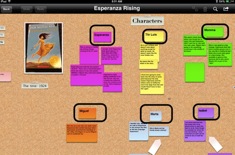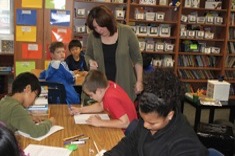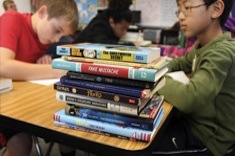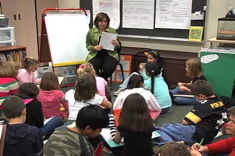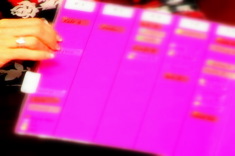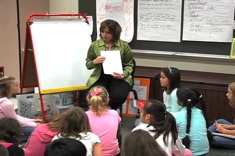What do we tell students about adults observing them in classrooms? I wrote this letter to Franki Sibberson's third graders after I visited, when Franki and I both realized the students had little understanding of or experience with visitors who are observing students to assess learning.
Dear Students:
Mrs. Sibberson asked me to write to you to share what I observed and learned from watching you this week.
Just to give you a little background first. I have been observing children for 30 years, since I was in graduate school in Michigan and New Hampshire long before any of you were born. People like me observe children because we believe there are patterns in how people of any age learn. Once we know your pattern, or the patterns of children your age, we know how to help you become a better reader, writer, and thinker.
Observing your class early in the year, I noticed that Mrs. Sibberson is strongly encouraging each of you to think hard about your reading and writing, look closely at what you are doing, and share your reading and writing breakthroughs with each other. You see, what I do as a researcher is something you can also do: look closely at what you like to read, what you like to write, where you read, where you write, who can help you in the classroom community, how you can be more efficient and get more joy out of books, writing, and hearing about the literacy of classmates. As you pay more attention to what works for you as a reader and writer (and what doesn’t), you’ll develop the skills and tools you need to become a stronger reader and writer.
I observed Mrs. Sibberson conferring with some of you individually. She asked questions that are sometimes hard for you to answer, especially early in the year. Things like “Why do you think you did that?” “How did that work for you?” “Based on reading this book, what might you read next?” It is hard work to learn how to look closely at your reading and writing, and even harder to learn how to put that into words and explain it to others. But the more you do it, the easier it becomes. You’ll learn to recognize when you’ve made a breakthrough in your reading or writing that shows you are growing and how smart you are, and you’ll also learn when it is worth sharing what you’ve learned with your classmates so they can grow more quickly too.
There will be many visitors in your classroom this year. As they watch you, they are trying to learn more about how children your age read and write so they can go out and work with other readers and writers your age (or even older!) and help them learn to read. When I go home to Maine, I’ll have conversations with other teachers where I say things like “One thing I noticed with a student in Mrs. Sibberson’s class is . . .” and then I will share something I learned from watching you. Even though I was in your room for only an hour, I will think about what I saw for many weeks after the visit.
So even though it may not seem like I am doing much when I am in the classroom, I am watching and thinking deeply about what I'm seeing. It’s not so different from what you are doing when you read, write, and talk in class with your classmates. It looks easy, but it is a lot of hard work to do it well. By letting visitors observe you, you’re helping teachers and children everywhere do their jobs better. Thank you for letting me visit and learn from you!
Brenda Power



